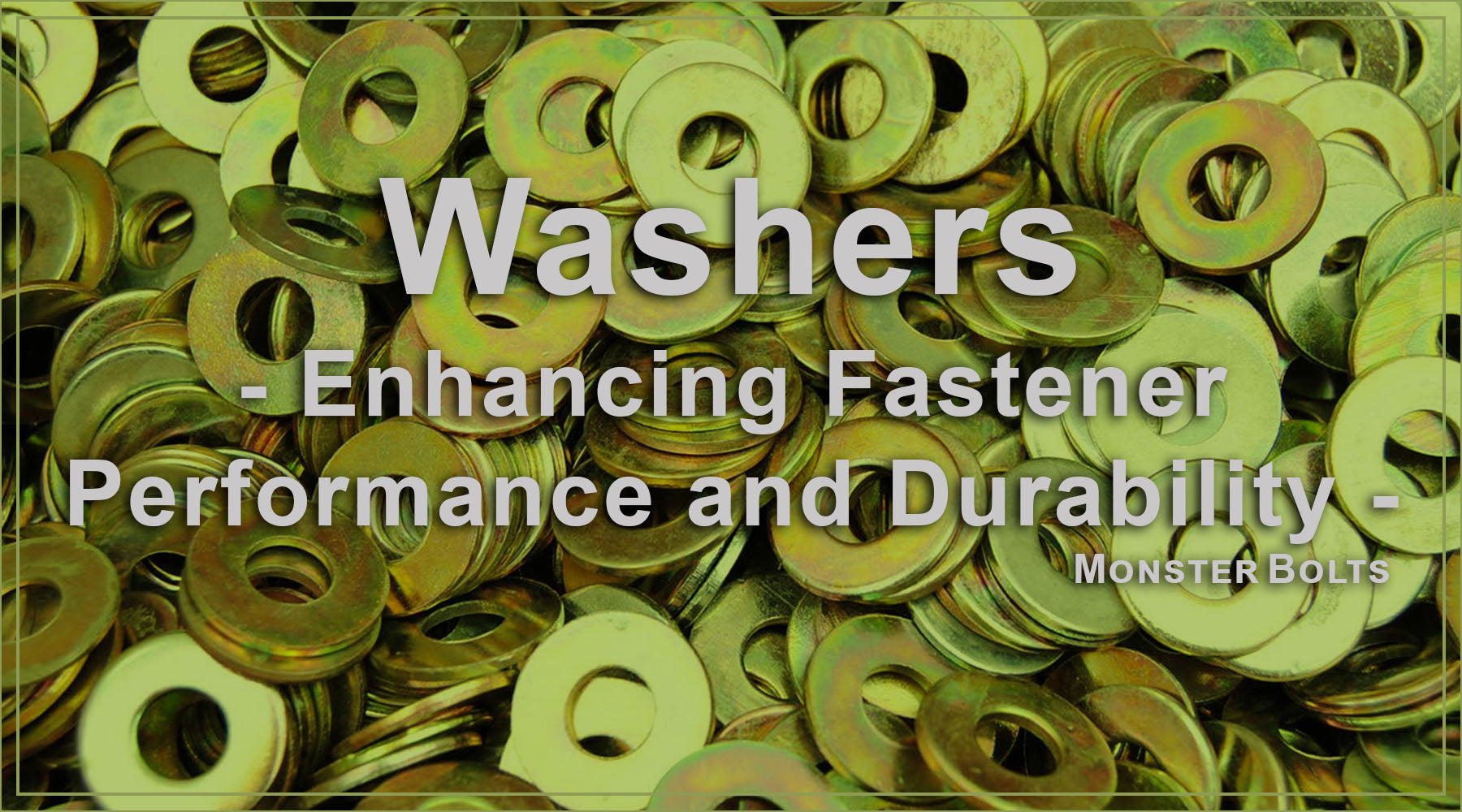Washer Types & Benefits: The Complete Guide
Quick Answer: Washers distribute load, protect surfaces, and help prevent loosening. The right washer depends on your material, environment, and vibration levels. Below we explain the main types—flat, lock, fender, sealing, and specialty—plus materials, finishes, standards, and FAQs.
Monster Bolts stocks a wide range of U.S. and Metric washers to match drawings and specs quickly.
Types of Washers
Flat Washers
General-purpose washers that distribute load and protect the bearing surface. Use under bolt heads and/or nuts.
- U.S.: Flat Washers (browse)
- Metric: Flat Washers – DIN 125A
- Metric (Thick): Thick Flat Washers – DIN 7349
- Structural (U.S.): ASTM F436 Structural Flat Washers
Tip: Match washer ID to bolt size; choose hardened/structural washers with higher-grade bolts.
Lock / Split Washers
Help resist loosening from vibration and dynamic loads. Split lock washers add spring tension; toothed/star washers bite into surfaces.
- U.S.: Split Lock Washers
- Metric: Split Lock Washers – DIN 127B
Use with correct hardness; for critical assemblies consider thread-locking compounds or prevailing-torque nuts as well.
Fender Washers
Large OD for extra bearing surface—great for oversized holes, thin sheet, plastics, and soft woods.
- U.S.: Fender Washers (Large OD)
- Metric: Fender Washers – DIN 9021
Choose stainless in corrosive or outdoor environments.
Sealing & Bonded Washers
Combine a metal washer with an elastomer (e.g., EPDM) for a liquid-tight seal—common on roofs, enclosures, and exterior panels.
- See TEK screws with bonded sealing washers (U.S.): Self-Drilling HWH w/ Sealing (EPDM) Washers
Match sealing material to temperature/chemistry; retorque after initial cycles if required.
Belleville (Conical) & Specialty Washers
Belleville (conical) washers provide high spring force in limited space. Specialty types include insulating (nylon), shoulder, and wave/spring washers for preload tuning.
- Metric Wave/Spring Example: See thick & specialty metric washers
Conical washers are directional—install with the cone facing the correct load direction per spec.
Materials & Finishes
| Material / Finish | Best For | Notes |
|---|---|---|
| Steel, Zinc Plated (CR+3 / CR+6) | General indoor use | Economical corrosion protection. Confirm RoHS where required. |
| Stainless 18-8 (A2/304) | General corrosion resistance | Good all-around stainless for indoor/outdoor; non-magnetic tendencies vary by work-hardening. |
| Stainless 316 (A4 / Marine Grade) | High-corrosion, marine, coastal | Superior pitting resistance in chlorides/salt spray. |
| Hot-Dipped Galvanized (HDG) | Heavy outdoor exposure | Thick zinc coating; ensure compatibility with bolt/nut coating & thread fit. |
| Black Oxide | Appearance / mild indoor protection | Low corrosion resistance; oil/wax can improve protection. |
| Nylon / Non-metallic | Electrical insulation, light duty, weight-sensitive | Non-conductive; lower mechanical strength. |
| Brass / Copper | Electrical / decorative / anti-spark | Corrosion resistant; softer than steel. |
Standards & Sizing
Match washers to your drawing/spec. Common references include:
- U.S. / Inch: ASTM F436 for structural flat washers; dimensional guidance via ASME/IFI standards.
- Metric: DIN 125A (flat), DIN 127B (split lock), DIN 9021 (fender), DIN 7349 (thick/structural).
How washers are measured: Inner diameter (ID), outer diameter (OD), and thickness. The ID should fit the screw/bolt size; OD and thickness depend on load and material.
Frequently Asked Questions
Are washers important?
Yes. They distribute load, protect surfaces, and help resist loosening from vibration—improving reliability and service life.
Are washers directional?
Most flat/fender washers are not directional. Split lock, conical (Belleville), and some tooth/star designs are directional—install per spec.
Are washers magnetic?
Carbon steel and some stainless grades can be magnetic; non-ferrous (brass, aluminum) and nylon are non-magnetic.
How are washers measured?
By ID, OD, and thickness. Match ID to fastener size; select OD/thickness for the support material and load.
When are washers necessary?
- To distribute load and protect softer materials
- To reduce loosening in vibrating assemblies
- To seal out water (with bonded sealing types)
- To meet structural/standard requirements (e.g., ASTM F436)
Where do washers go on a screw/bolt?
Typically between the fastener head (or nut) and the surface. For through-bolts, use under the nut—and optionally under the head—per spec.
What’s the difference between a lock washer and a split washer?
“Lock washer” is the broad family. A “split” washer is a specific spring-type lock washer; tooth/star washers lock by biting into surfaces.
Do washers affect torque values?
Yes. Surface finish, hardness, and lubrication all impact friction and clamp load. Follow the torque spec for your assembly and washer type.
Can washers be reused?
Flat and fender washers can often be reused if undamaged. Lock/spring and sealing types may lose effectiveness after first use—inspect and replace as needed.
What materials are washers made from?
Commonly steel (zinc plated, galvanized, black oxide), stainless (304/316), brass, copper, nylon, and other non-metallics. Choose based on environment and load.
How do I choose the right washer?
Consider the base material, environment (corrosion/temperature), vibration, and required standards. When in doubt, choose stainless for corrosion and use structural/hardened washers for high-strength bolts.
Shop Washers
- U.S. — All U.S. Washers
- U.S. — Flat Washers | Structural (ASTM F436) | Split Lock | Fender
- Metric — Flat (DIN 125A) | Split Lock (DIN 127B) | Fender (DIN 9021) | Thick (DIN 7349)
Need help choosing? Call (850) 764-2658 or email support@MonsterBolts.com — we’re happy to help.

